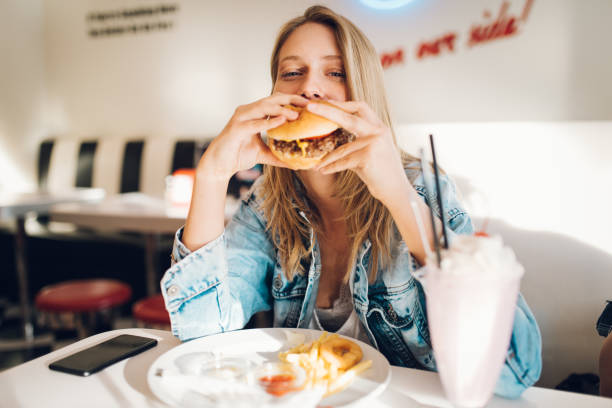
Does a bad diet lead to hair loss?
Hair loss is usually caused by genetic factors, with androgenic alopecia (otherwise known as female pattern baldness) being the most common form. However, hair loss can also be triggered by many other things, such as stress, post pregnancy, menopause, and even a poor diet.
Diet and nutrition can often contribute to increased hair loss, mainly down to the fact that the hair is starved of specific nutrients. When you don’t get the vitamins, minerals, and other nutrients that your body needs from your diet, it can cause the hair to fall out.
Hi sugar, low protein, and processed foods can play their part in causing the hair to be thinner, prone to breakage and excessive shedding. Junk food does not cause hair loss on its own, but it can play its part.
What foods cause hair loss?
Hair loss is no different to any other part of your body, be it your skin, your nails, your organs etc., so the better your diet and lifestyle is, the more your hair will thrive. Doctors and trichologists will often tell their patients to get vital nutrients into their diet for better overall health.
Foods like sugary snacks, fast food, processed food, and low in protein foods, can seriously deprive the hair of the vital nutrients it needs, not only to grow, but to prevent the unnecessary fall of hair.
Here, we look at some of the vitamins and minerals that are vital for optimal hair growth.
Essential vitamins and minerals for healthy hair growth
Zinc
Zinc is a mineral that helps with immune function, protein synthesis, and cellular division. Zinc plays a crucial role for hair follicle function, and helps protect against hair follicle shrinkage and slowed growth. It can also help promote hair follicle recovery.
A zinc deficiency can cause hair to fall out, and studies show that people with certain hair loss conditions tend to have lower zinc levels than people without hair loss. The recommended daily amount of zinc is 8 milligrams (mg) for women and 11 mg for adult men.
Zinc can be found in foods like oysters, red meat, poultry, beans, nuts, and whole grains.
Iron
A deficiency in iron can lead to hair fall. This can be a problem for many people on the vegan diet, as it isn’t easy to get a lot of pure iron into a vegan diet.
Severe iron deficiency anemia can cause symptoms such as shortness of breath, fatigue, and chest pain, some people also experience hair loss.
Iron can be found in foods such as seafood, beans, leafy vegetables, spinach and apricots. The average daily iron intake from foods and supplements is 17.0–18.9 mg/day in women older than 19. The median dietary iron intake in pregnant women is 14.7 mg/day.
Biotin (Vitamin B7)
The signs and symptoms of biotin deficiency typically appear gradually and can include thinning hair with progression to loss of all hair on the body. A deficiency in vitamin B7 is a common cause of excessive hair shedding.
Most multivitamin hair supplements contain a generous dose of biotin, which primarily boosts hair and nail growth. It is also a good vitamin for the skin, helping the cells to repair and grow.
Biotin can be found in foods like organ meats, eggs, fish, meat, seeds, nuts, and certain vegetables like sweet potatoes. To prevent a biotin deficiency, the daily recommended adult intake is 30 to 100 micrograms (mcg) per day.
Vitamin D
Research shows that a lack of vitamin D can cause hair loss. Vitamin D can stimulate new and old hair follicles, which leads to the maintenance and growth of hair. When there isn’t enough vitamin D in your system, new hair growth can be slowed, or even stunted completely. Taking a daily dosage of vitamin D should be your priority, especially if you have thin/thinning hair.
Vitamin D can be found in foods like oily fish, red meat, liver, egg yolks, butter and mushrooms. The daily recommended vitamin D intake is around 15 mcg for adults.
Other vitamins for hair growth
Other vitamin deficiencies that can cause hair loss are; Vitamin A, Vitamin F, Vitamin E, Folic Acid, Copper, and Choline. Hair loss can be daunting, but luckily, there are plenty of options to stop it. If your hair loss is due to a vitamin deficiency, then you can add foods and supplements to your diet, to give your body what it needs.
Conclusion
It is best to talk to your doctor before starting a vitamin supplement to make sure it will not interfere with any current medications or conditions. Be sure to get plenty of good nutrients into your diet, and try and be as active and as healthy as you can. This is not only sound advice for hair loss sufferers, but also for your health and wellbeing, in general.
Multivitamin hair supplements are also a good source of vitamins that can help slow down hair loss, and promote the function of healthy hair growth. They are safe, easy to take, and convenient. If you are looking to slow down hair loss and maintain normal growth, then you should consider a good multivitamin hair supplement like HR23+ or Viviscal.


Leave a Reply